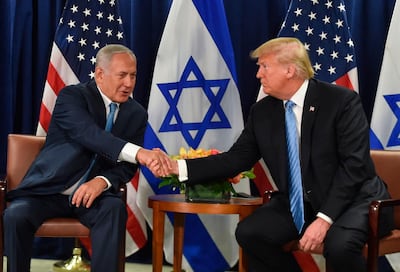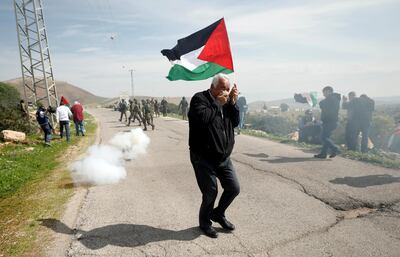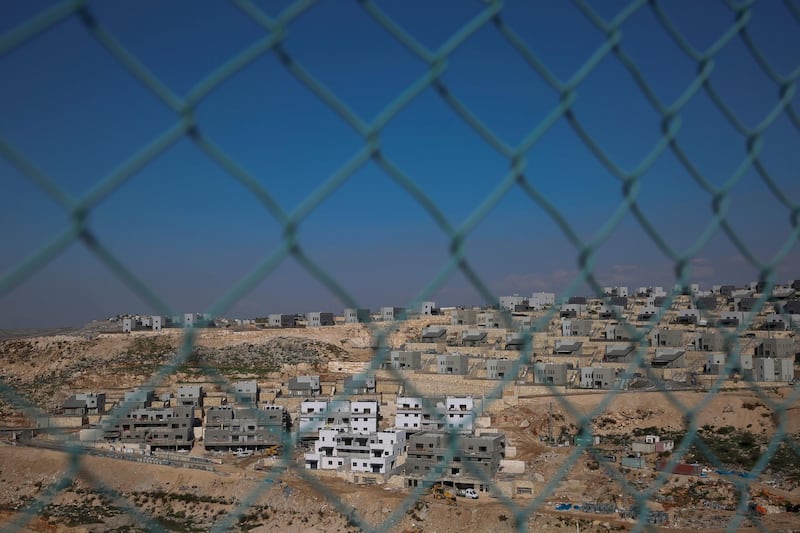Israel has dramatically increased its illegal settlement building and plans for future units in the West Bank since US President Donald Trump entered the Oval Office, representing a construction splurge that threatens to deal the final blow to a future sovereign Palestinian state, according to data obtained by The National.
Figures collected by the Israeli anti-settlement watchdog Peace Now from official government records show that Israel’s hardline government has approved thousands more tenders for settlement construction in the first two years of the Trump presidency than those prior to his election victory.
The numbers suggest that Israel’s intention is to build as much as possible and as quickly as it can while a US administration that refuses to oppose its settlement enterprise, deemed illegal under international law, sits in power. It is a push that appears aimed at preventing an end to its occupation of East Jerusalem and the West Bank, one that further fades any hope of a political settlement to the decades-long conflict.
They show a significant rise in settlement construction starts, with the first nine months of 2018 representing a 20 per cent increase on the year prior.
More startling for the Palestinians is that Israeli government tenders for settlement building – government proposals issued for the construction of housing units – shot to their highest levels on record.
In 2016, Prime Minister Benjamin Netanyahu’s government issued just 42 tenders for construction. That came in the last year of former US President Barack Obama’s administration, which was viewed as hostile to Israel’s hard-right policies. Eight years of pressure from the Democrat commander-in-chief and close allies like Secretary of State John Kerry pushed Israel to slow its settlement construction.
But just a year later, with Mr Trump in power, those tenders rose to 3,154. In 2018, the tenders shot up again to 3,808, the highest ever.
"From this data we have deduced that the Israeli government has for a second year supported a dramatically higher rate of settlement growth, due to domestic reasons and because of the unwillingness of the US administration to deter settlement expansion," Brian Reeves, director of external relations at Peace Now, told The National.
The rapid expansion of settlement tenders means Palestinians can expect years of heightened settlement construction as the process moves from planning to the launch of construction, at a time when hopes of peace have never been lower.

More than 400,000 Jewish settlers live in outposts dotted around the West Bank, a network the Palestinians say is aimed at preventing a contiguous Palestinian state and potentially the eventual annexation of the territory right-wing nationalist Israelis consider to be the biblical home of the Jews. Much of the building takes place in Area C of the West Bank, which is under full Israeli control and represents around 60 per cent of the territory.
Approximately 150,000 more live in occupied East Jerusalem, the area of the contested city the Palestinians seek as the capital of any future sovereign state. It hosts some of the most revered places of worship for Christians, Jews and Muslims, including the Haram Al Sharif, otherwise known as the Noble Sanctuary, which is the third-holiest site in the Islamic world.
Israel seized both territories from Jordan in the 1967 Arab-Israeli War and has maintained a decades-long occupation of both that remains reviled throughout the Arab world.
________________
Read more:
UNRWA looks to Gulf countries for support in the long term
Saeb Erekat: Trump administration is trying to divide Palestinian leadership
Israeli soldiers kill three in Gaza and one in West Bank
________________
Settler populations are set to grow even further with plans for more than 12,000 units advanced in 2017 and 2018, according to the Peace Now figures, almost triple the number advanced in the two years prior to his shock victory over Hillary Clinton.
Israel’s far-right was immediately emboldened by Mr Trump’s election win after he had campaigned on moving the American embassy from Tel Aviv to Jerusalem, a promise he kept, and campaign comments that Israel should continue its settlement building, despite international criticism.

The change of rhetoric and lack of opposition from the White House made Israel move fast. It approved its first new settlement for two decades and embarked on a series of new announcements for settlement units.
In his first two years as president, Mr Trump has courted Israel and disregarded the Palestinians, making moves officials in Ramallah say are aimed at changing the status quo on the ground in favour of Israel. A much-vaunted peace plan has failed to materialise, increasing suspicion in the West Bank that one does not even exist.
If it does, the Palestinians say they will reject it anyway, anticipating that it will include proposals they could never accept, such as a confederation with Jordan, Abu Dis as the Palestinian capital and a demi-state without the functions of a sovereign nation.
Mr Trump has not hidden his lack of intention to build trust on the Palestinian side. In creating his Middle East team, he secured his former bankruptcy lawyer David Friedman as US ambassador to Israel. He is an individual who has helped to fund projects in Beit El, one of the most hardline West Bank settlements, lobbied for the US to recognise Jerusalem as Israel's capital and referred to Jews opposed to Israeli policies as "kapos", or traitors.
He handpicked Jared Kushner, his son-in-law, as the man tasked with striking the “ultimate deal”. But his family has funded settlements in the West Bank and is deeply pro-Israel.
Every step he has taken on the protracted conflict – from ending funding for Palestinian refugees and sick residents of East Jerusalem, to boycotting Unesco and the UN Human Rights Council over pro-Palestinian decisions – has deepened the feeling in Ramallah that a US administration led by Mr Trump will never be the impartial mediator that the Palestinians seek.





